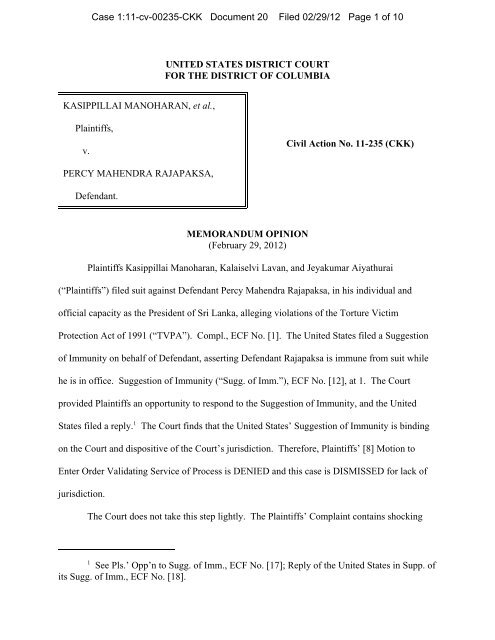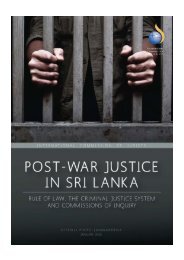dismissed a lawsuit - Lawfare
dismissed a lawsuit - Lawfare
dismissed a lawsuit - Lawfare
You also want an ePaper? Increase the reach of your titles
YUMPU automatically turns print PDFs into web optimized ePapers that Google loves.
Case 1:11-cv-00235-CKK Document 20 Filed 02/29/12 Page 1 of 10UNITED STATES DISTRICT COURTFOR THE DISTRICT OF COLUMBIAKASIPPILLAI MANOHARAN, et al.,Plaintiffs,v.Civil Action No. 11-235 (CKK)PERCY MAHENDRA RAJAPAKSA,Defendant.MEMORANDUM OPINION(February 29, 2012)Plaintiffs Kasippillai Manoharan, Kalaiselvi Lavan, and Jeyakumar Aiyathurai(“Plaintiffs”) filed suit against Defendant Percy Mahendra Rajapaksa, in his individual andofficial capacity as the President of Sri Lanka, alleging violations of the Torture VictimProtection Act of 1991 (“TVPA”). Compl., ECF No. [1]. The United States filed a Suggestionof Immunity on behalf of Defendant, asserting Defendant Rajapaksa is immune from suit whilehe is in office. Suggestion of Immunity (“Sugg. of Imm.”), ECF No. [12], at 1. The Courtprovided Plaintiffs an opportunity to respond to the Suggestion of Immunity, and the UnitedStates filed a reply. 1 The Court finds that the United States’ Suggestion of Immunity is bindingon the Court and dispositive of the Court’s jurisdiction. Therefore, Plaintiffs’ [8] Motion toEnter Order Validating Service of Process is DENIED and this case is DISMISSED for lack ofjurisdiction.The Court does not take this step lightly. The Plaintiffs’ Complaint contains shocking1See Pls.’ Opp’n to Sugg. of Imm., ECF No. [17]; Reply of the United States in Supp. ofits Sugg. of Imm., ECF No. [18].
Case 1:11-cv-00235-CKK Document 20 Filed 02/29/12 Page 2 of 10allegations of human rights abuses and violations of United States and international law. TheCourt’s dismissal of this case is in no way a reflection of the merits of Plaintiffs’ claims orDefendant’s defenses. Rather, two centuries of case law and basic constitutional and statutoryprinciples prevent this Court from allowing Plaintiffs’ Complaint to move forward at this time.I. BACKGROUNDPlaintiffs filed this action as the legal representatives of relatives Plaintiffs allege werethe victims of extrajudicial killings while living in their native Sri Lanka. Compl. 3-5.Plaintiffs allege Defendant has “virtually unlimited government power in Sri Lanka,”“exercise[s] command responsibility over the Sri Lankan armed forces or security services,” and“knew or should have known of the extrajudicial killings under color of foreign law of[Plaintiffs’ relatives].” Id. at 6. Plaintiffs thus seek to hold Defendant liable for the killingsunder the TVPA. Id. at 63-104. After filing the Complaint on January 28, 2011, Plaintiffsspent nearly eleven months attempting to serve Defendant with process. See 5/31/11 StatusReport, ECF No. [4]; 8/12/11 Status Report, ECF No. [5]; 10/13/11 Order, ECF No. [7](authorizing service by publication); 11/21/11 Supplemental Mot. for Serv. by Publication, ECFNo. [8]. After attempting to serve Defendant via publication in Sri Lankan newspapers,Plaintiffs filed a [8] Motion to Enter Order Validating Service of Process, which is currentlypending before the Court.On December 16, 2011, Defendant moved to solicit the views of the United Statesregarding (i) Defendant’s entitlement to head of state and foreign official immunity;(ii) justiciability of Plaintiffs’ claims under the political question doctrine; and (iii) theapplicability of the act of state doctrine to this case. Def.’s Mot. to Solicit Views of the United2
Case 1:11-cv-00235-CKK Document 20 Filed 02/29/12 Page 3 of 10States and for Enlargement of Time to Resp. to the Compl., ECF No. [9], at 1. In the alternative,Defendant moved for additional time to respond to the Complaint. Id. The Court ordered theUnited States to indicate whether it would file a response to Defendant’s request. 12/30/11Order, ECF No. [10]. In response to the Court’s Order, the United States filed a Suggestion ofImmunity, asserting that Defendant is immune from suit in this case while Defendant is in office.Sugg. of Imm. at 1; 1/13/12 Ltr. H. H. Koh to T. West, ECF No. [12-1].II. DISCUSSIONThe United States submits that its determination that Defendant Rajapaksa is entitled tohead of state immunity “is controlling and is not subject to judicial review.” Sugg. of Imm. at 2.Plaintiffs contend that the plain text of the TVPA bars the application of head of state immunityto claims brought under the statute. As explained below, the Court agrees with the United Statesthat the Court is bound by the State Department’s Suggestion of Immunity, and after applyingthe proper canon of statutory construction, it is clear head of state immunity applies to claimsbrought under the TVPA. Lacking jurisdiction to proceed, the Court will dismiss the case.A. Foreign Sovereign Immunity and Suggestions of Individual ImmunityThe immunity of foreign sovereigns in United States courts is a common law doctrinerecognized by the Supreme Court nearly two centuries ago. In Schooner Exchange v.McFaddon, 7 Cranch 116 (1812), Chief Justice John Marshall “concluded that, while thejurisdiction of a nation within its own territory ‘is susceptible of no limitation not imposed byitself,’ the United States had impliedly waived jurisdiction over certain activities of foreignsovereigns.” Verlinden B.V. v. Cent. Bank of Nigeria, 461 U.S. 480, 486 (1983) (quoting id. at3
Case 1:11-cv-00235-CKK Document 20 Filed 02/29/12 Page 4 of 10136). 2 The decision in Schooner Exchange “came to be regarded as extending virtually absoluteimmunity to foreign sovereigns.” Id. Following Schooner Exchange, courts employed a twopartprocedure to determine whether a foreign sovereign or foreign official was immune fromsuit. As the Supreme Court explained:Under that procedure, the diplomatic representative of the sovereign could requesta “suggestion of immunity” from the State Department. If the request wasgranted, the district court surrendered its jurisdiction. But “in the absence ofrecognition of the immunity by the Department of State,” a district court “hadauthority to decide for itself whether all the requisites for such immunityexisted.”. . . Although cases involving individual foreign officials as defendantswere rare, the same two-step procedure was typically followed when a foreignofficial asserted immunity.Samantar v. Yousuf, 130 S.Ct. 2278, 2284-85 (2010) (quoting Ex parte Peru, 318 U.S. 578, 581,587-88 (1943)).Prior to 1952, the State Department generally suggested immunity in all actions broughtagainst foreign sovereigns. Id. at 2285. In 1952, the State Department departed from thispractice, and adopted a “restrictive” theory of foreign sovereign immunity, which limitedimmunity to “suits involving the foreign sovereign’s public acts,” but not “cases arising out of aforeign state’s strictly commercial acts.” Id. (quoting Verlinden, 461 U.S. at 487). However, theinfluence of political considerations led to inconsistent submission of suggestions of immunityunder this “restrictive” theory. Id. To remedy the inconsistent application of foreign sovereignimmunity by the State Department, Congress enacted the Foreign Sovereign Immunities Act2 “In accordance with Chief Justice Marshall’s observation that foreign sovereignimmunity is a matter of grace and comity rather than a constitutional requirement,” Republic ofAustria v. Altmann, 541 U.S. 677, 689, Plaintiffs’ reliance on the test for evaluating thePresident’s exercise of constitutional authority as outlined in Youngstown Sheet & Tube Co. V.Sawyer, 343 U.S. 579, 634 (Jackson, J., concurring), is misplaced.4
Case 1:11-cv-00235-CKK Document 20 Filed 02/29/12 Page 5 of 10(“FSIA”) in 1976. Id. Until 2010, a majority of Circuits held that the FSIA governed not onlyforeign sovereign immunity, but also claims of immunity by individual officers of foreign states.Yousuf v. Samantar, 552 F.3d 371, 378 (4th Cir. 2009) (collecting cases). In Samantar, theSupreme Court interpreted the FSIA to govern only the application of foreign sovereignimmunity to foreign states, not foreign officials. 130 S.Ct. at 2292-93. Rather, the pre-FSIAcommon law regarding head of state and diplomatic immunities continues to govern whether, asin this case, an individual official from a foreign sovereign is entitled to immunity from suit. Id.In accordance with the post-Schooner Exchange procedure, the State Department filed aSuggestion of Immunity in this case, reflecting the State Department’s determination thatDefendant Rajapaksa is entitled to head of state immunity while in office. The StateDepartment’s Suggestion of Immunity is conclusive and not subject to judicial review. E.g., Exparte Peru, 318 U.S. at 589-90 (“The certification and the request that the vessel be declaredimmune must be accepted by the courts as a conclusive determination by the political arm of theGovernment.”); Ye v. Zemin, 383 F.3d 620, 625-27 (7th Cir. 2004) (holding courts must defer tothe State Department’s Suggestion of Immunity even in cases involving alleged violations of juscogens norms). “The precedents are overwhelming. For more than 160 years American courtshave consistently applied the doctrine of sovereign immunity when requested to do so by theexecutive branch.” Spacil v. Crowe, 489 F.2d 614, 617 (5th Cir. 1974). “When, as here, theExecutive has filed a Suggestion of Immunity as to a recognized head of a foreign state, thejurisdiction of the Judicial Branch immediately ceases.” Doe I v. State of Israel, 400 F. Supp. 2d86, 111 (D.D.C. 2005); accord, id. (“When the Executive Branch concludes that a recognizedleader of a foreign sovereign should be immune from the jurisdiction of American courts, that5
Padiham: Plan DOS Map 1910
















